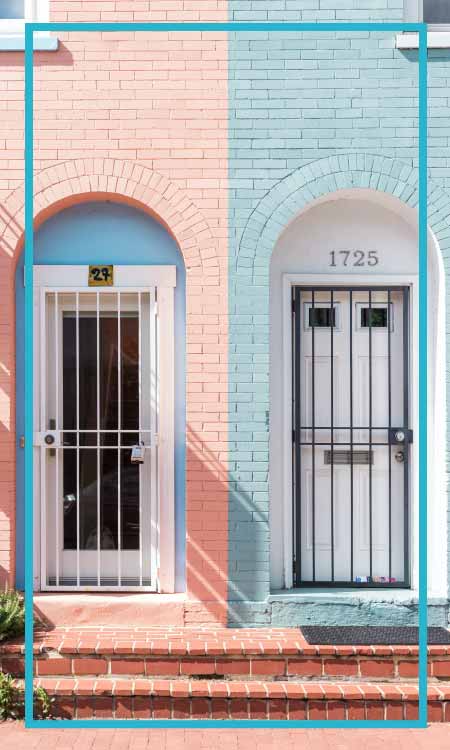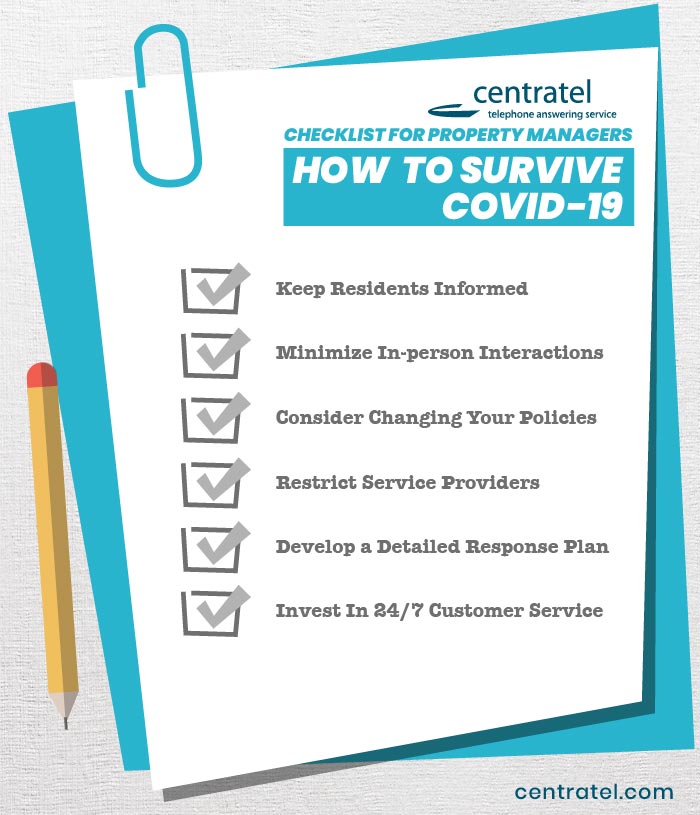
Here’s how
As businesses begin to reopen in the wake of the coronavirus pandemic, it can be difficult to know what timeline you should follow and how quickly you can resume operating as usual, especially if you’re a property manager. Though your business likely suffered financially during the outbreak of COVID-19 in the United States, reopening your doors is not a decision to make lightly, as you must ensure your clientele feel confident your company has done everything in its power to make its properties safe and sanitized. Luckily, we’ve compiled a thorough checklist for property managers who are navigating this transitional time.
As you plan and prepare to reopen, these tips should help mitigate your fears and ease your worries. Property managers around the country are in this together, and following some simple, shared guidelines for how to proceed ensures your reopening will be a successful one, drawing clients from near and far who have been unable to find new housing during a difficult time.

Read on to learn how your property management company can and will survive COVID-19.

Keep Residents Informed
In times of crisis, people want to be informed. They feel more secure and safe when they are receiving a steady stream of communication and information.
As a property manager, you can lead the charge on ensuring your residents remain fully informed of any important executive decisions made by your company during this time, as well as providing some educational content about COVID-19 so that your residents are sure to stay safe and socially distanced.
Give your residents easy access to this information by setting up an online resident web portal or sending out mass emails and text messages. Other common, perhaps more traditional ways of communicating with residents, such as by paper flyer, should be avoided at this time to lessen the chance of people congregating at a shared site, potentially putting themselves at risk of spreading disease and infection. Additionally, there’s less of a chance that residents will see a paper flyer if they are staying inside and at home more often than usual.
You also want to protect your employees’ health at this time by ensuring they can safely communicate with residents. One foolproof way to do this is to take residents’ questions or concerns via the internet and telephone.
Minimize In-person Interactions
What we currently know is that the coronavirus spreads most easily when people are in close quarters with one another, as infectious droplets can jump from person to person. The Center for Disease Control and Prevention (CDC) advises that the best way to stay healthy is to keep a distance of at least six feet between yourself and other people.

As a property manager, you can keep your residents healthy and safe by minimizing the number of times they are forced to interact with other people face-to-face each day. If residents usually pay rent in-person, set up a way for them to pay rent online instead of having to come down to the office. Instead of conducting walk-throughs of your properties for interested parties, send them a link to a virtual or video tour. Close all shared amenities like pools, rec centers, and gyms — or require your residents to follow strict social distancing guidelines.
Consider Changing Your Policies
Many property owners have revised their policies regarding evictions and late rent payments due to the overwhelming number of people who have been financially affected by the pandemic.
You may also want to consider adding in vacancy periods to your scheduling. After someone moves out, for instance, be sure to follow the CDC’s recommended vacancy period before sending in staff to inspect, clean, or perform maintenance.
Follow up each vacancy period with a thorough disinfection of the unit, focusing on high-contact surfaces.
Restrict Service Providers
If you have any open contracts with service providers, such as plumbers or gardeners, be clear on the measures they are taking to protect themselves and their clients during this time. If needed, restrict the amount of work being done on-site, which may require you to review contracts for clauses on work delays or stoppages. Just as you don’t want your residents interacting with your employees or one another, you also don’t want additional personnel entering and leaving your buildings, as this allows more opportunities for disease to spread.

Develop a Detailed Response Plan
In times of crisis, some leaders become paralyzed by indecision, while others choose to seek out opportunity in the midst of chaos. You, as the lead decision-maker for your company, must think and act flexibility and proactively — to seize this opportunity and develop a detailed response plan that can be used now or in any situation that requires an emergency response.
Invest In 24/7 Customer Service
An answering service provides immediate and constant customer service for your clients — both residents and property owners — throughout this trying time. While you are busy balancing your desire to serve your clientele while still keeping everyone safe, your phones are likely ringing off the hook with residents’ questions, comments, and concerns. These calls cannot go unanswered. Your community must feel seen and heard, now more than ever.
As you perform a thorough reset on your facilities and audit your operations for safety, it can be difficult to maintain consistent and reliable customer service to your clients.
Ensure their needs are still being met on a daily basis by hiring an experienced and dedicated answering service to take and redirect your calls.
Some of your employees may still need to work from home, especially if they have young children or elderly members of their family living with them. Child care may not be available, or perhaps you simply don’t want to open your central office just yet. With an answering service by your side, your employees can easily continue to support your company from home, even if they require more flexibility with regards to setting their hours and times of availability. Your answering service will pick up the slack and provide 24/7 service to residents and their families.
Keep in mind that you are providing an essential service to those who need shelter in your community. Be proud of the work you are doing, and most of all, remember that you don’t have to do it alone. A respected and reliable answering service will have your back 7 days a week, 24 hours a day.
